I needed to separate integers into 3-digit numbers and looked into the formatted() method of the Decimal type.
Calling the formatted() method of type Decimal 100,000 times each for a random integer gradually degrades performance.
I would like to know why this happens.
import Foundation
/// https://stackoverflow.com/a/56381954
func calculateTime(block : (() -> Void)) {
let start = DispatchTime.now()
block()
let end = DispatchTime.now()
let nanoTime = end.uptimeNanoseconds - start.uptimeNanoseconds
let timeInterval = Double(nanoTime) / 1_000_000_000
print("Time: \(timeInterval) seconds")
}
calculateTime { for _ in 0...100_000 { _ = Decimal(Int.random(in: 0...Int.max)).formatted() } }
calculateTime { for _ in 0...100_000 { _ = Decimal(Int.random(in: 0...Int.max)).formatted() } }
calculateTime { for _ in 0...100_000 { _ = Decimal(Int.random(in: 0...Int.max)).formatted() } }
calculateTime { for _ in 0...100_000 { _ = Decimal(Int.random(in: 0...Int.max)).formatted() } }
calculateTime { for _ in 0...100_000 { _ = Decimal(Int.random(in: 0...Int.max)).formatted() } }
calculateTime { for _ in 0...100_000 { _ = Decimal(Int.random(in: 0...Int.max)).formatted() } }
calculateTime { for _ in 0...100_000 { _ = Decimal(Int.random(in: 0...Int.max)).formatted() } }
calculateTime { for _ in 0...100_000 { _ = Decimal(Int.random(in: 0...Int.max)).formatted() } }
Time: 0.9492465 seconds
Time: 3.29213125 seconds
Time: 7.988363667 seconds
Time: 15.165178292 seconds
Time: 17.305036583 seconds
Time: 25.0114935 seconds
Time: 35.746310417 seconds
Time: 47.024551125 seconds
